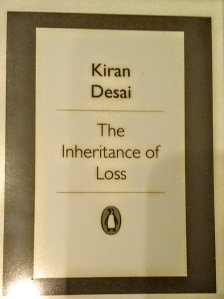
Author: Kiran Desai
Finished on: 28 December 2016
Where did I get this book: A kindle purchase
This, Kiran Desai’s second novel, won the Booker prize in 2006. Set across three continents, and three generations, it is impressive in scope. And at its heart, this is a book about injustice, and the deep chasms of inequality that exist between people, and countries.
It is desperately sad. Books like this normally have me howling at the moon crying with the unfairness of it all. But not this one. Desai’s writing is frequently stunning, and particularly strong where she is describing the landscape and changing lifestyles of the people in the Indian sections that make up the majority of the book. But while she is beautiful on the abstract and the environment, the characterisation is another matter entirely.
Maybe it’s because I read this so soon after Jhumpa Lahiri’s Interpreter of Maladies, a book that has some of the same themes around the strangeness and difficulties of living as an immigrant in a new country. Lahiri’s writing successfully placed you well, truly and hugely movingly, in the shoes of her characters. By comparison I never felt real empathy for anyone in The Inheritance Of Loss. Despite the horrendous trials they face.
The twin narratives of the book tell mirroring stories: one of a poor cook’s son, Biju, living in New York as an illegal immigrant, exploited and treated little better than an animal in the new world he felt like ‘the luckiest man in the world’ to go to. The other narrative follows Biju’s father’s employer, a successful judge, two generations earlier as he studies in London.
Despite the difference in their social status, both men suffer a terrible loss of dignity and identity living in countries where they are not respected, and not accepted. Desai’s take on movement between countries is an almost unremittingly negative one in this book. Not only in terms of the short-term challenges faced by immigrants during the time they spend away from home, but also the long-term legacy as they act as the host of an irreconcilable clash that means even when they return home, it’s not really home anymore. They are stuck in a kind of cultural limbo.
We meet the judge as an old man, living out his limbo in the Indian Himalayas during the Gorkhaland conflict of the 1980s. He lives with his granddaughter Sai, who has fallen in love with her Nepalese science tutor. There is so much scope in the plot for passionate and poignant engagement with these characters in the desperate situations they find themselves in. But, Desai seems to keep us deliberately at arm’s length.
At one point, when Sai is hoping for her lover’s return:
She waited, read Wuthering Heights twice over, each time the potency of the writing imparting a wild animal feeling to her gut – and twice she read the last pages – still Gyan didn’t come.
Maybe Desai is pointing out the futility of wishing for life to match the drama of a book like Wuthering Heights. Maybe it’s true that frustration and a kind of detached bleakness is more realistic.
But, as Lahiri proved so beautifully in Interpreter Of Maladies, amazing bridges can be built when a writer makes us feel what their characters are feeling. And I can’t help thinking that imparting a little bit more ‘wild animal feeling’ into characterisation would have made Desai’s story absolutely sing.
But I am biased. I am all about the people and the drama. The Inheritance Of Loss is a studied, understated and accomplished telling of a fascinating story. If you don’t think Wuthering Heights is the finest book ever written, you will probably love it.

I think you liked this far more than I did – I enjoyed it in part but also found some aspects were disappointing. here’s my review if you are interested https://bookertalk.com/2016/03/16/the-inheritance-of-loss-by-keiran-desai/
LikeLiked by 1 person
Great review! I agree with a lot of what you’ve written. I wasn’t aware of the controversy, but feel exactly the same about the characterisation. Good to know it wasn’t just me missing something!
LikeLiked by 1 person